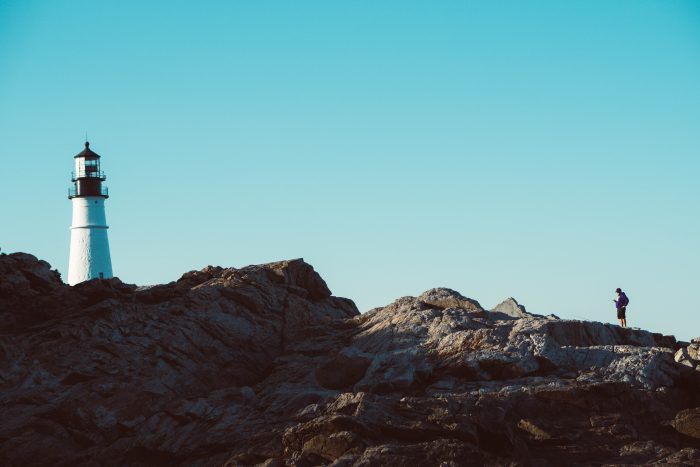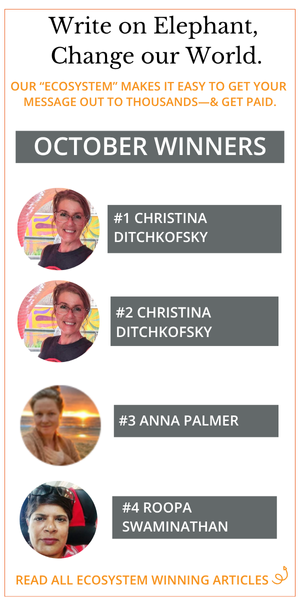A friend of mine recently shared a quotation that stirred me to think anew about the meaning of “presence.”
The quote, from Anne Lamott, a warm and compassionate autobiographical writer, was about lighthouses:
“Lighthouses don’t go running all over an island looking for boats to save; they just stand there shining.”
The quote is from Lamott’s well-loved book, “Bird by Bird.” She was writing about the light that shines on a page when authors are writing the clearest, truest words they can. Although Lamott’s focus was the writer’s presence on a page, her words inspired me to see the more general quality of presence in a new light.
Also, the quotation reminded me of beautiful lighthouses on the Oregon Coast, not terribly far from where I live in Portland.
I’d like to share my interpretation of Ms. Lamott’s words and their meaning in my life and in a snippet of my yoga practice as well. And I invite you to share your interpretation of the quote in any comments you might wish to make.
Presence as an Inner Light
As I reflected on why I was drawn to the quote, two thoughts came to me. The first was that the metaphor subtly challenged my existing conception of presence. I realized that I tended to view presence as something I did: I paid attention. When I was present with others, I paid attention to what they were saying or feeling. When I was present with tasks on my to-do list, I paid attention to getting them done. When I was present with myself, I paid attention to sensations, thoughts, and emotions that were arising.
Presence also was paired in my mind with guilt—guilt about not being present. When my kids were little, for example, I played card games with them that held their interest for a long time but didn’t hold mine. I played anyway to be a good dad. When one of my sons was older, he said something to me like, “Dad, you aren’t really into this, are you?” I felt caught. And I felt like a bad dad. The risk of not paying attention fully was to be confronted with my own self-absorption.
But when I thought of the lighthouse, I didn’t wonder how hard she was working to reach the ships at sea. I didn’t ask how far into the bay her light beamed or how clearly ship captains received her beacon. I felt the simple presence of her light.
And I wondered whether I could be with my own light in a less effortful way. Could I focus less on the strength of my attention and more on its source? Could I open more to the light that fueled my attention and less on how long I was able to pay attention or how successful I was at pushing myself to stay attentive?
At first blush, imagining myself as a lighthouse and paying attention from a light-filled space seemed like a heady, ethereal pursuit. But it didn’t take long to turn to my yoga practice for an assist. Translating celestial notions into the earth, water, and fire of my body can help turn symbols, like Lamott’s metaphor, into felt experiences. And yoga is an important way for me to do this.
So, I imagined myself as a lighthouse while doing a seated twist. The steady base of my pelvis was like the firm base of the lighthouse, and my skeletal structure was like its walls. When I lengthened and rotated my spine while keeping my pelvis level, it was like walking up the lighthouse’s spiral staircase. I felt a warm breeze of light flowing from my sacrum to my heart center and up through the back of my skull. And then I sensed the light beaming out from the crown of my head, like the light beaming from the lighthouse tower.
In this twist, I noticed that if I rotated too quickly and forcefully, I put a kink in the column of light that traced my spine from base to crown. The light was obscured, and the twist felt more like tightening a screw than sweeping around to gain a wider vision.
But while twisting, if I slowed down and breathed into my kidneys and the front, sides, and back of my heart, the central column of light was kept open. It’s as if I could walk freely up the spiral staircase while observing through the little windows on the sides of the lighthouse, and the wide, Pacific seascape below.
I could feel in my body that presence isn’t just about paying attention. It’s about keeping open the space that holds and channels our light and gives our attention lift.
As I settled into this notion of presence, I was surprised that, as a non-Christian, something akin to the Christian concept of grace came to me. The light of presence struck me as being the gift of divine grace. It was not a quality to earn or achieve. It was a quality we received as an essential part of our humaneness.
Presence can be Enough
The second thought that came to me as I took in Lamott’s quote was that being present with others didn’t mean I had to forever be checking in with them about their unmet needs. I didn’t get presence points by continually searching for ships in distress that might benefit from my help. Sometimes, standing in my light was enough.
I am blessed with a wife, three grown sons, and grandchildren, and family members have assured me that I don’t have to be doing something visibly helpful to be a beneficial presence in their lives. If I’m bathed in the light of a star and feeling the connection to Spirit that this brings (another instance of grace?), I’m better able to let go of my ego needs to be validated as a giving person. I can more easily share my light with family members and receive the light that they share.
I may want to give my grandkids gifts, for example, but I can trust that the sharing of our inner lights is what’s most valuable, not the gifts themselves or the gifts as proof that I’m a loving grandpa.
Anne Lamott’s quotation has prompted me to reimagine presence and experience it differently. With her quotation as a gentle guide, I’ve discovered that presence, and its mutual sharing with others, doesn’t have to be hard or directive. It can be quietly peace-giving and joyful.
Author Acknowledgments: I want to thank Kasey Stewart for her sensitive review and discerning comments on an earlier draft of this essay.

 Share on bsky
Share on bsky





Read 26 comments and reply